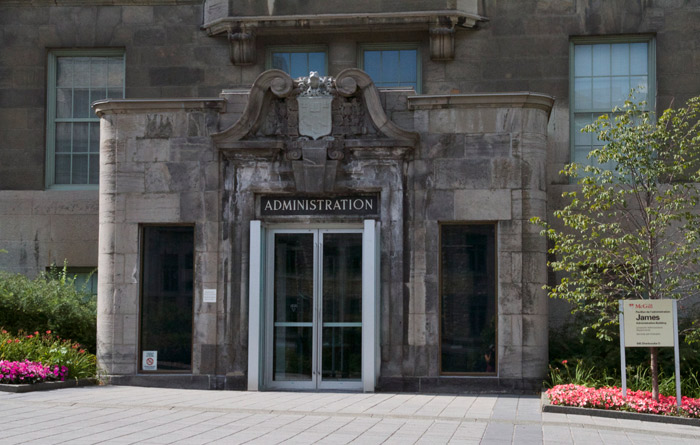At its first meeting on Sept. 21, the McGill Senate reviewed reports on research misconduct, sexual harassment, and social equity from the past year. During the session, Senate appointed a new assessor under the Policy on Harassment, Sexual Harassment and Discrimination Prohibited by Law, and laid out the plan for the finalization of McGill's Territorial Acknowledgment statement.
Research Misconduct
Dr. Abraham Fuks, professor in the Departments of Medicine, Pathology, and Oncology, and last year’s Research Integrity Officer, presented the Annual Report Concerning the Investigation of Research Misconduct. The report analyzes incidents in the past year and compares them to cases from prior years.
“The number of allegations are stable over the past number of years, which is good news,” Fuks said.
According to Fuks, in 2010, 83 per cent of research misconduct allegations came from within McGill, while this year most allegations came from external sources.
“[Allegations in the past year] have come regularly […] from external entities,” Fuks said. “Mostly [from] colleagues elsewhere or […] journals who have noticed an irregularity in reviewing a manuscript that was submitted.”
The report noted that all allegations this year proceeded to investigation or inquiry. Of the 33 allegations made in the past six years, only seven were dismissed.
“[McGill researchers] have undergone a fairly rigorous internal process,” Fuks said. “So the rate of findings of misconduct seems high only because they’ve done the first cut.”
Sexual Harassment
Associate Provost (Policies, Procedures, and Equity) Angela Campbell presented the Appointment of Assessors Memorandum and the Annual Report on the Policy on Harassment, Sexual Harassment & Discrimination Prohibited by Law. Due to an increase in reported incidents of harassment from 23 in the 2014-2015 to 39 in the 2015-2016 academic year, the university has improved the training and number of staff members dedicated to receiving and investigating these incidents.
The number of assessors has been increased from eight to 10 and their training has become more rigorous. In addition, Dr. Natalie Oswin of the Department of Geography was voted the new Harassment Assessor. According to the Appointment of Assessors Memorandum, Oswin was chosen for her experience working with queer and postcolonial theory. Assessors directly handle all complaints of violations of the Policy.
“We increased the level and the quantity and quality of assessors’ training […] to enhance its professionalism,” Campbell said. “We had monthly meetings last year in addition to a two-day training retreat [….] The training was on issues of process, how can you be an effective assessor and a fair assessor, but also on substance, so, the meaning of the three grounds on which individuals can bring forth concerns or complaints.”
This retreat involved training by individuals from the Social Equity and Diversity Education (SEDE) Office, an organization that aims to cultivate a more inclusive campus through training and education. To aid the assessors, the role of Senior Equity and Inclusion Officer was created. The individual chosen for the role in Fall 2016 will mediate between sexual harassment complainants and the university.
“She or he will be responsible for the intake piece, advise them on what options are available for someone who comes with an inquiry, and then will also have a role with respect to facilitating an informal resolution where that’s desired by the party,” Campbell said.
Senators raised concerns over a figure showing that 72 per cent of complaints of sexual harassment and discrimination at McGill did not move beyond the initial inquiry phase.
“It’s a really big decision [for complainants] to proceed with an investigation. There [are] also questions of ‘does this fall under harassment?,” Campbell said.
Social Equity
Campbell also presented the Annual Report of the Joint Board Senate Committee on Equity (JBSCE). The JBSCE is mandated to look at the status and recruitment of underrepresented groups on campus, which includes visible minorities and Aboriginal peoples. The report reviewed the activities of its six subcommittees in the past year. The Subcommittee on Queer People has been coordinating with IT services to implement the use of preferred names on McGill online platforms.
“MyCourses is tricky,” Campbell said. “The systems in place–the IT systems are not all aligned– so this makes it quite complicated. We’re engaging [IT Customer Services (ICS) …] in terms of helping us understand where the challenges lie.”
The Subcommittee on First Peoples reached consensus on its Traditional Territory Acknowledgment, which recognizes McGill’s settlement on Haudenosaunee and Anishinaabeg sites of meeting and sets forth an agenda for consultations with these groups.
“The goal is to allow them to continue [with consultations] so that the Subcommittee can then finalize its Territory Acknowledgment statement,” Campbell said. “The statement that has been put out is the statement that is used for now, but once the subcommittee returns with what it sees as its own finalized statement […] there [will be] a possibility to revisit the statement that was issued.”








